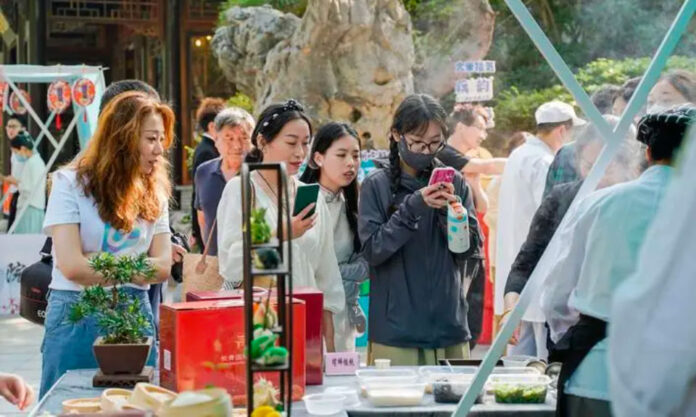Who has not snapped a pic of their meal? Especially when the dishes were particularly eye catching or lovingly prepared? Likely that may have been just as a keepsake, but when 20 million people see your photo online, it’s a whole other ball game.
Yangzhou in our very own Jiangsu Province is famed for its food, as initiated by the celebrated dish, Yangzhou Fried Rice, so much so that in 2019 UNESCO granted it the status of “City of Gastronomy”.
And so it was that when the 5th China Morning Tea Culture Festival closed on 31 May, it was revealed that in excess of 20 million people had been attracted to join the festivities online.
At that point, Yangzhou had seized the unofficial title of “top internet celebrity city”. Temporarily of course, for other cities are continually waiting in the wings.
This is a trend which illustrates the driving force behind changes in urban development, namely its shift from investment-driven to consumption-driven and innovation-driven.
Competition between cities in China today is more than a GDP figure; it’s now all about popularity.
That’s what put Zibo, a city in central Shandong Province previously better known for heavy industry, on the map and in the minds and stomachs of many the past few months.
There, it’s meat kebabs which have brought in the hoards. The BBC notes that in March alone, Zibo welcomed more visitors than its total population of 4.5 million. It was the product of a catchphrase to have recently emerged; “Let’s go as soon as you say it”.
Elsewhere, people have been saying much the same about going to Changsha to eat lobster, or Chongqing for hot pot.
Back in Yangzhou, that “Zaocha”, or early breakfast tea, has become an institution. The premise is simple, but effective; an early-morning meal with delicious little treats, together with steaming hot tea.
While it has nothing in common with English afternoon tea (other than it being snacks and wet), it is similar in so far as being something of a ritual. As the China Daily-run website, SeeYangzhou.com, notes, “Zaocha in Yangzhou is a traditional, cultural and overwhelmingly social event”.
And its the enthusiasm for such a tradition that has turned food into urban development.
From 25-27 May during the China Morning Tea Culture Festival, there was an endless stream of customers for morning tea in Quyuan Garden, one of Yangzhou’s four time-honoured tea houses. Refreshments and snacks provided by more than 60 exhibitors were sold out in advance; they simply could not replenish in time to satisfy demand.
It’s the result of 5 consecutive years of effort that has allowed people to see the increasingly-widespread influence of Yangzhou as that so-called City of Gastronomy.
But radiating from a ritual to the city as a whole, the success of the China Morning Tea Culture Festival has obvious spillover effects.
As QQ News reports, Yangzhou’s Municipal Bureau of Commerce is making every effort to build a consumption chain with morning-tea culture as the fuse for the future.
With food, culture and consumption as their guide, the Bureau has given itself the key task this year of guiding businesses to provide high-quality services in developing a city business model described as “morning tea, afternoon coffee, evening wine, midnight snack”.
Yangzhou is doing the smart thing. And in many ways, its experience with the China Morning Tea Culture Festival is a case study in making the most of what you have. As Xia Qiquan, a professor at the School of Tourism and Culinary Arts at Yangzhou University, said, “You can’t expect residents from other cities to come here to buy houses and cars, but they can come here for food”.









